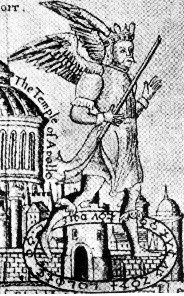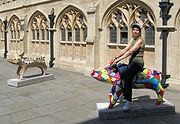
Bladud
Encyclopedia

Britons (historical)
The Britons were the Celtic people culturally dominating Great Britain from the Iron Age through the Early Middle Ages. They spoke the Insular Celtic language known as British or Brythonic...
, for whose existence there is no historical evidence. He is first mentioned in Geoffrey of Monmouth
Geoffrey of Monmouth
Geoffrey of Monmouth was a cleric and one of the major figures in the development of British historiography and the popularity of tales of King Arthur...
's Historia Regum Britanniae
Historia Regum Britanniae
The Historia Regum Britanniae is a pseudohistorical account of British history, written c. 1136 by Geoffrey of Monmouth. It chronicles the lives of the kings of the Britons in a chronological narrative spanning a time of two thousand years, beginning with the Trojans founding the British nation...
, which describes him as the son of King Rud Hud Hudibras
Rud Hud Hudibras
Rud Hud Hudibras was a legendary king of the Britons as recounted by Geoffrey of Monmouth. He was the son of King Leil and ruled during a civil war....
, and the tenth ruler in line from the first King, Brutus. This idea may have been based on a misinterpreted scrap of Welsh genealogy. The Welsh form of the name is given as Blaiddyd in manuscripts of the Brut Tysilio (Welsh translations of Geoffrey's Historia). In the text he is said to have founded the city of Bath.
The tale of Bladud was later embellished by other authors, such as John Hardyng
John Hardyng
John Hardyng , English chronicler, was born in the north.As a boy he entered the service of Sir Henry Percy , with whom he was present at the Battle of Shrewsbury . He then passed into the service of Sir Robert Umfraville, under whom he was constable of Warkworth Castle, Northumberland, and Kyme...
and John Higgins, writing in the sixteenth century. In its final form Bladud was sent by his father to be educated in the liberal arts in Athens
Athens
Athens , is the capital and largest city of Greece. Athens dominates the Attica region and is one of the world's oldest cities, as its recorded history spans around 3,400 years. Classical Athens was a powerful city-state...
. After his father's death he returned, with four philosophers, and founded a university
University
A university is an institution of higher education and research, which grants academic degrees in a variety of subjects. A university is an organisation that provides both undergraduate education and postgraduate education...
at Stamford
Stamford, Lincolnshire
Stamford is a town and civil parish within the South Kesteven district of the county of Lincolnshire, England. It is approximately to the north of London, on the east side of the A1 road to York and Edinburgh and on the River Welland...
in Lincolnshire
Lincolnshire
Lincolnshire is a county in the east of England. It borders Norfolk to the south east, Cambridgeshire to the south, Rutland to the south west, Leicestershire and Nottinghamshire to the west, South Yorkshire to the north west, and the East Riding of Yorkshire to the north. It also borders...
, which flourished until it was suppressed by Saint Augustine of Canterbury
Augustine of Canterbury
Augustine of Canterbury was a Benedictine monk who became the first Archbishop of Canterbury in the year 597...
on account of heresies which were taught there. Supposedly he ruled for twenty years from 863 BC or perhaps 500 BC, in which time he built Kaerbadum or Caervaddon (Bath), creating the hot springs there by the use of magic. He dedicated the city to the goddess Athena
Athena
In Greek mythology, Athena, Athenê, or Athene , also referred to as Pallas Athena/Athene , is the goddess of wisdom, courage, inspiration, civilization, warfare, strength, strategy, the arts, crafts, justice, and skill. Minerva, Athena's Roman incarnation, embodies similar attributes. Athena is...
or Minerva
Minerva
Minerva was the Roman goddess whom Romans from the 2nd century BC onwards equated with the Greek goddess Athena. She was the virgin goddess of poetry, medicine, wisdom, commerce, weaving, crafts, magic...
, and in honour of her lit undying fires, whose flames turned to balls of stone as they grew low, with new ones springing up in their stead: an embellishment of an account from the fourth-century writer Solinus of the use of local coal on the altars of her temple.

Leprosy
Leprosy or Hansen's disease is a chronic disease caused by the bacteria Mycobacterium leprae and Mycobacterium lepromatosis. Named after physician Gerhard Armauer Hansen, leprosy is primarily a granulomatous disease of the peripheral nerves and mucosa of the upper respiratory tract; skin lesions...
, and when he returned home he was imprisoned as a result, but escaped and went far off to go into hiding. He found employment as a swineherd at Swainswick
Swainswick
Swainswick is a small village and civil parish, north east of Bath, on the A46 in the Bath and North East Somerset unitary authority, Somerset, England. The parish has a population of 284...
, about two miles from the later site of Bath, and noticed that his pigs would go into an alder-moor in cold weather and return covered in black mud. He found that the mud was warm, and that they did it to enjoy the heat. He also noticed that the pigs which did this did not suffer from skin diseases as others did, and on trying the mud bath himself found that he was cured of his leprosy. He was then restored to his position as heir-apparent to his father, and founded Bath so that others might also benefit as he had done.
The tale claims that he also encouraged the practice of necromancy
Necromancy
Necromancy is a claimed form of magic that involves communication with the deceased, either by summoning their spirit in the form of an apparition or raising them bodily, for the purpose of divination, imparting the ability to foretell future events or discover hidden knowledge...
, or divination through the spirits of the dead. Through this practice, he is said to have constructed wings for himself and to have tried to fly to (or from) the temple of Apollo
Apollo
Apollo is one of the most important and complex of the Olympian deities in Greek and Roman mythology...
in Trinovantum (London) or Troja Nova (New Troy), but to have been killed when he hit a wall, or to have fallen and been dashed to pieces or broken his neck. He was supposedly buried at New Troy and succeeded by his son, Leir
Leir of Britain
Leir is a legendary ancient king of the Britons, as recounted by Geoffrey of Monmouth. His story is told in a modified form by William Shakespeare in the play King Lear. In the drama, some names are identical to those of the legend Leir is a legendary ancient king of the Britons, as recounted by...
. Eighteenth century Bath architect John Wood, the Elder
John Wood, the Elder
John Wood, the Elder, , was an English architect. Born in Twerton England, a village near Bath, now a suburb, he went to school in Bath. He came back to Bath after working in Yorkshire, and it is believed, in London, in his early 20s...
wrote about Bladud, and put forth the fanciful suggestion that he should be identified with Abaris the Hyperborean
Abaris the Hyperborean
Italic text:Abaris redirects here. For the Baroque opera see Les BoréadesAbaris the Hyperborean , son of Seuthes, was a legendary sage, healer, and priest of Apollo known to the Ancient Greeks. He was supposed to have learned his skills in his homeland of Hyperborea, near the Caucasus, which he...
, the healer known from Classical Greek sources.

